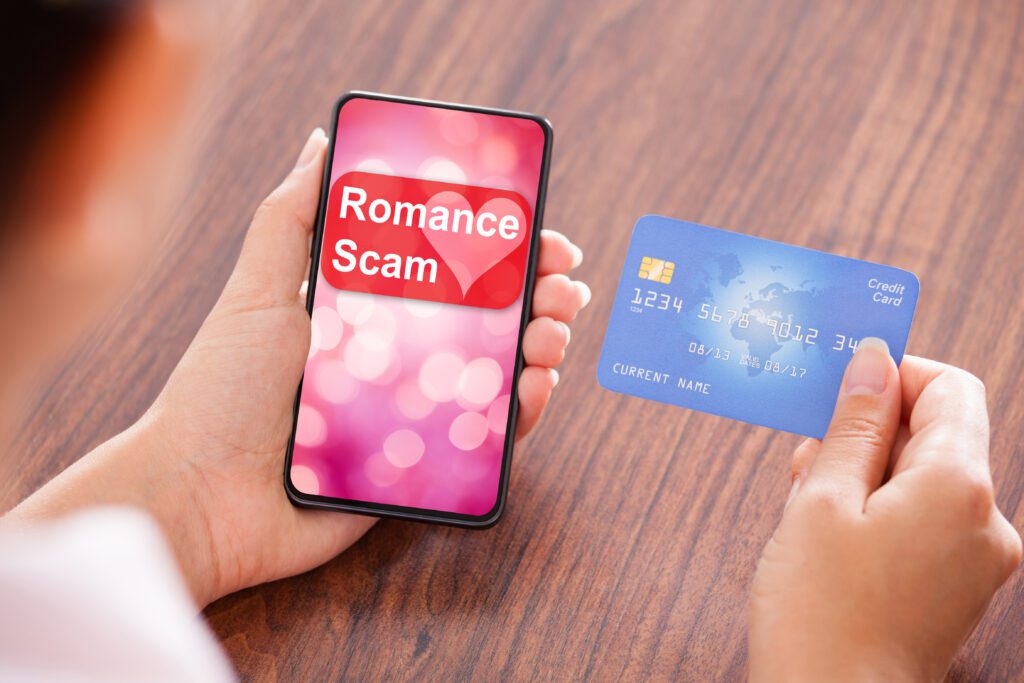
January 16, 2024
Teach Your Members How to Avoid Romance Scams

It’s that time of year when people are working towards their New Year’s Resolutions and trying to have the best start possible. Finding new love in the new year could very well be one of those resolutions! Unfortunately, scammers are well aware of this fact and will take full advantage. This is why teaching your members how to avoid romance scams is so important.
Much of the fraudulent activity you’ll see today is online. Some common scams reported to the Federal Trade Commission (FTC) include military romance scams, scams on social media, and elder romance scams.
Military Romance Scams
How much more romantic can it be than to fall in love with a faraway hero? You meet this amazing person online, but they can’t speak to you or show their face because they’re in Ukraine or Afghanistan.
Sounds like it could be legit, right? WRONG. Being super secretive and avoiding being heard or seen are common themes in military romance scams.
They may send messages to you frequently, giving the impression of sincere interest. However, if they quickly say they’re “in love” with you – hit the brakes! Especially if this confession of love is soon followed by a monetary or gift request. These actions are signature signs of military romance scams.
Scams on Social Media
A large chunk of romance scams are initiated on social media. Whether it be a Facebook romance scam, romance scams on Instagram, or LinkedIn romance scams, fraudsters have done them all! Here are scenarios to watch out for within each platform to help members know how to avoid romance scams on social media.
Facebook Romance Scam
If a scammer is going to attempt to trick you on Facebook, they’ll create a fake profile and reach out to you. They may send a friend request or a private message that seems innocent. They’ll likely start chatting with you regularly, then make up a story and ask for money.
Avoid a Facebook Romance Scam: You can avoid these scams by not befriending anyone that you haven’t met in person. This also goes for accepting private messages. Review your privacy settings in Facebook to make sure only your friends can see your information and can send you messages.
Romance Scams on Instagram
According to a report from the FTC, 40% of those who lost money to a romance scam were first contacted on a social media platform such as Instagram.
One of the biggest romance scams on Instagram is called sextortion. A scammer convinces their target to send explicit photos and later threatens to share them with their other social media contacts, unless they pay! The FTC states that 58% of sextortion cases reported in 2022 identified social media platforms such as Instagram and Snapchat as the top contact methods.
Avoid Romance Scams on Instagram: Do a reverse image search of a person’s profile picture before you even consider talking to a stranger via social media. If the details don’t match up, you know it’s a fake profile! Also, be sure to talk to friends or family about an online love interest before you get too involved. Someone close to you may have been scammed before and can help you avoid heartache!
LinkedIn Romance Scams
Wait, people actually try to find romance on LinkedIn?! Well, not exactly. Scammers can use LinkedIn to learn about your career and financial background in order to develop schemes to manipulate you and get your money. Perhaps they use your profile to create a fake one that includes similar experiences and interests to get your attention.
Via LinkedIn, scammers can make themselves look extremely successful or affluent, so when they suddenly have a financial emergency, you trust they’ll be able to pay you back.
Avoid LinkedIn Romance Scams: Don’t simply trust a person’s LinkedIn profile. Ask them questions. If they seem too good to be true, they likely are.
If the person fails to show up after multiple attempts at meeting in video or in person, this is a big red flag! Also, like with other social media platforms, research their profile photo to see if the details match.
Elder Romance Scams
The rise of scams on social media has been a major contributor to elder romance scams, especially since the year 2020. Although dating scams affect people of all ages, adults that are between 55 and 64 years old are at the highest risk. According to the Department of Homeland Security, older adults reported losing almost $139 million to romance scams in 2020.
Avoid Elder Romance Scams: Stay informed about common and new scams by following websites such as the Federal Trade Commission (FTC). Limit what you share online and what personal information you share with a love interest. If you haven’t met someone in person, be extra cautious – and if they avoid meeting in person, be suspicious. If someone you haven’t met asks you to send money, it’s time to cut off communication; it’s a scammer!
How Your Credit Union Can Help
You can teach your members how to avoid romance scams by sharing what you’ve learned here, and by staying up to date on popular scams. Write blog articles and create social media posts about military romance scams, scams on social media, and elder romance scams. Sign up for consumer alerts at consumer.ftc.gov and use the information to alert your members.
Ensure your employees know the common ways scammers request payments, such as via wire transfer, gift card, and cryptocurrency. This way, if a member mentions these, a red flag will go up. If you discover a member has been scammed or that an attempt was made, be sure to have them report it at ReortFraud.ftc.gov.
By educating yourself, your credit union staff, and your membership, you can ensure that everyone knows how to avoid romance scams!